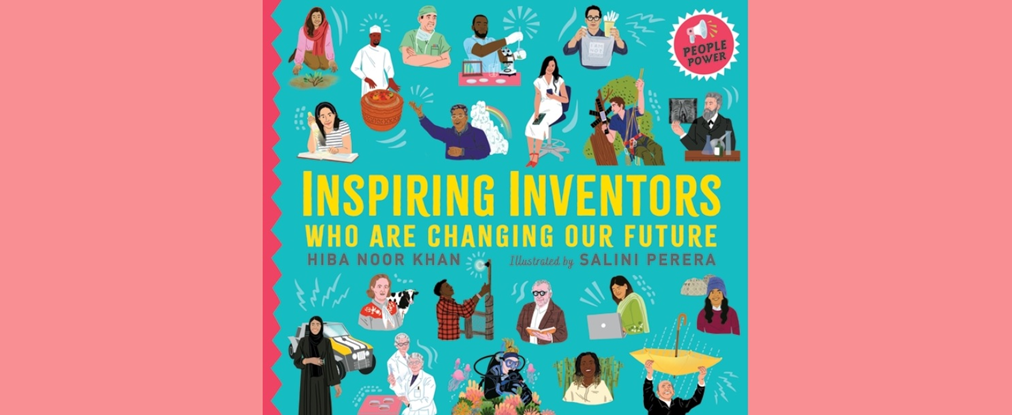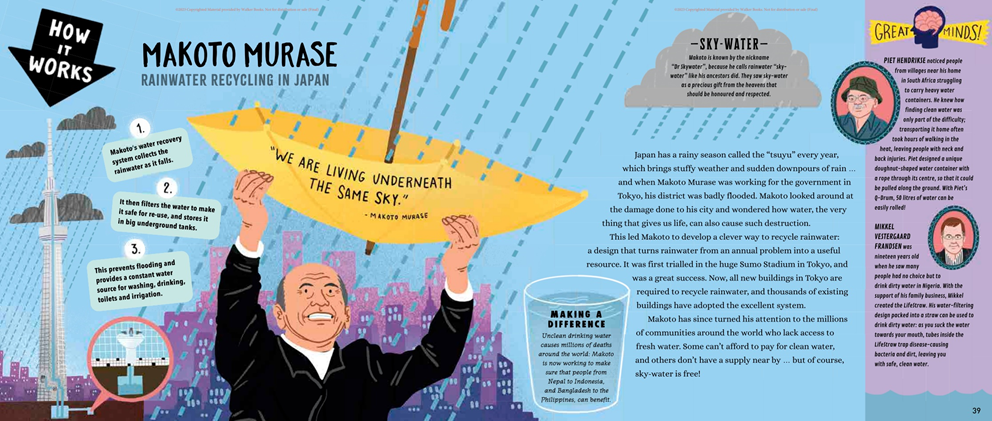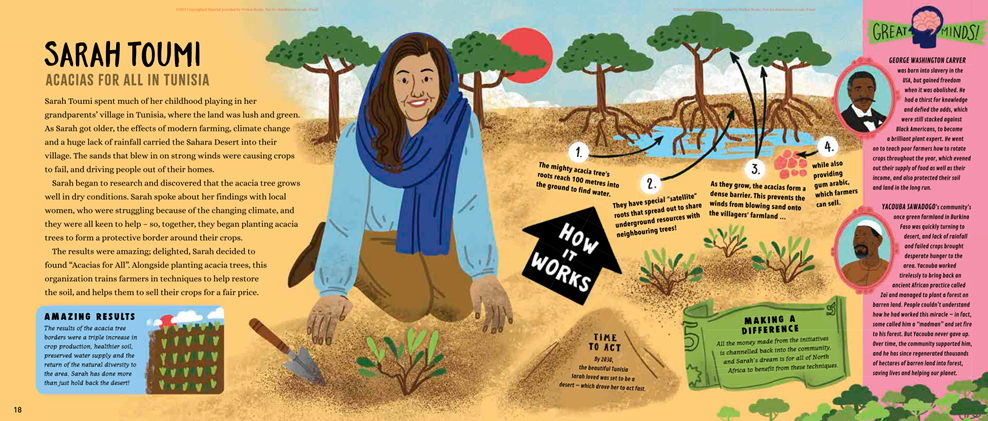Hiba Noor Khan & Salini Perera


About Author
Hiba Noor Khan is a double-Masters holder who has worked in refugee advocacy for The Children's Society, as a physics teacher and as a TV presenter. In 2019, she was commissioned to write Malala as part of the Extraordinary Lives Series. She has also written for the Independent, Huffington Post and Amaliah on subjects ranging from Isis to turmeric lattes.
Salini Perera was born in Sri Lanka, raised in Scarborough, Canada, and now illustrates books from her home in Toronto, where she lives with her husband. Her previous work include Madam C.J. Walker Builds a Business, a Rebel Girls spin-off novel; visit her website: www.saliniperera.com
Interview
Inspiring Inventors Who Are Changing Our Future (Walker Books)
September 2023
Discover 20 inventors from around the world who have helped solve a problem faced by their communities. Inspiring Inventors Who Are Changing Our Future by Hiba Noor Khan, illustrated by Salini Perera, shows how an often simple answer to a problem people face can help improve people's lives - without damaging the environment.
Among the inventions in its pages are jars that keep food cold in the desert; a torch that is powered by your own body heat; and cheap biodegradable plastic that dissolves in the sea, reducing plastic pollution.

Hiba Noor Khan also showcases the inventors who helped make today's inventions possible, and inspires the next generation of young people to think about solutions to everyday problems in their own world. After all, some of the inventors we meet the pages of her book were children themselves when they started to think about solutions to their problems.
Watch Hiba introduce Inspiring Inventors Who Are Changing Our Future in this short video, sharing some of the pages with us, and find out more about how her book was created in the following Q&A:
Q&A with Hiba Noor Khan
"All too often, the ideas of 'progress' and 'advancement' are linked only to bigger, faster, quicker. I believe this is a very dangerous approach, one that has led us to the climate disaster we're currently facing, as well as global inequalities."
1. Hello Hiba, can you tell us a little about yourself and what you enjoy about being an author?
I love reading, writing, and almost anything that allows me to express my creativity, from pottery to poetry, to painting. I also really enjoy science, and writing non-fiction for children allows me to merge these two passions in a fun, joyous way!
I've travelled to different countries around the world implementing humanitarian projects, from delivering aid to refugees, to helping farmers transform their land through permaculture. These experiences got me thinking deeply about the impact science and technology could and should truly have on our world, and sowed the seeds for some of my books.
2. What is your new book, Inspiring Inventors Who Are Changing Our Future, about?
The book is all about putting the heart and soul into science and technology, and thinking about how these areas can be used to make our world a better, fairer place for all. All too often, the ideas of 'progress' and 'advancement' are linked only to bigger, faster, quicker. I believe this is a very dangerous approach, one that has led us to the climate disaster we're currently facing, as well as global inequalities. I want to encourage readers to rethink what we should be using science for, and to embrace the notion of compassionate, sustainable invention.
3. What kinds of inventions did you want to include in the book? What were your priorities?
I tried to include a range of ethical inventions that work in different areas, from animals to the earth, healthcare to housing. My only criteria was that the inventor's priority was making our world a better place in some way. Some were designed in a traditional lab environment, while others came about on a rural farm or in the middle of a rainstorm. I wanted to show that you don't need to be a university-educated scientist to invent; some of those featured were just children when they started designing!
4. Can you tell us about some of the inventors you feature, and how you found out about them?
There's Makoto Murase with his clever way of using sky water (rain) for cities instead of letting it go to waste; Reem Al Marzouqi with an ingenious car that allows people to drive without use of their arms; Ann Makosinski with a torch that shines solely using heat from the human body; and SO many more incredible inventors!
I did lots of research online to look for the types of inventions that fitted my criteria of making the world a better place, and narrowed them down to a shortlist, before selecting the final 21, though I wish there had been space for more!

5. Why is it important that children learn about the kinds of problems that face different communities around the world?
We all share one planet, and the gift of being human. I believe that part of what truly makes us human is having empathy and concern for the welfare of others, and that can only really come once we have an understanding of their plight and needs. The first step in building a kinder world is to gently educate young minds about these important issues.
6. Why did you also want to show the kinds of new ideas that can lead on from one invention to the next? Can you give us an example?
I feel it's important to honour those who paved the way for us, and to celebrate their hard work that has laid the ground work for, or inspired later, developments. So many incredible scientists and inventors from across the world and across the ages haven't been credited for their contributions, and this was my small way of doing so.
An example is Al-Jazari from the 1100s in what is now Turkey, who laid the foundations for all of modern robotics. He is featured on the spread about Marita Cheng's Teleport Robot, and centuries before computers, he invented hundreds of systems that have been used in everything from engines to automatic doors.
7. Do any particular projects stand out for you in terms of their ingenuity or their potential to lead to great change?
Sarah Toumi's work planting acacia trees to prevent fertile soil turning into desert is incredibly powerful. I love hearing about the use of indigenous techniques and wisdom to care for and heal our planet, and find it wondrous that these incredible trees can transform entire regions, saving communities from losing their homes to climate change.
Kevin Kumala's biodegradable 'plastic' bags made from cassava are natural enough that they dissolve in water, and are safe enough to drink! Like Kevin, I've been fortunate to swim in different oceans, and have witnessed the havoc that plastic wreaks underwater, so this invention was very exciting to learn about.
I also love the way that Abeer Seikaly considers human dignity in her ingenious design for refugee tents; how everyone has as right to a home, and what home truly means.

8. You also encourage readers to think about their own inventions. What would you like to see the next generation of inventors create?
I'd love to see creativity and science used in conjunction to address the various facets of the climate crisis, from desertification and soil degeneration, to water security and natural disaster prevention and protection.
9. What did you think when you saw the illustrations by Salini Perera? Any favourites?
I absolutely loved the bold, vibrant colours Salini used throughout the book, they really draw you in. She did a fantastic job of visually showing the reader how the inventions work, breaking them down step by step, and also bringing the inventors themselves to life!
It's tricky to pick favourites, but I do especially love the spreads featuring Topher White and Sonam Wangchuck; they really transport me to the lush jungle and high up to the Himalayas!
10. Any more non-fiction books to come? What is your favourite part of working on books like these?
I'm working on another book about my love for the natural world at the moment. I love the way that the research stretches my mind, and teaches me things I didn't know before, which shapes the book as I go along!
See further books in the People Power series from Walker Books:

Caring Conservationists Amazing Activists Super Sports Stars
 Inspiring Inventors Who Are Changing Our Future: People Power series
Inspiring Inventors Who Are Changing Our Future: People Power series
